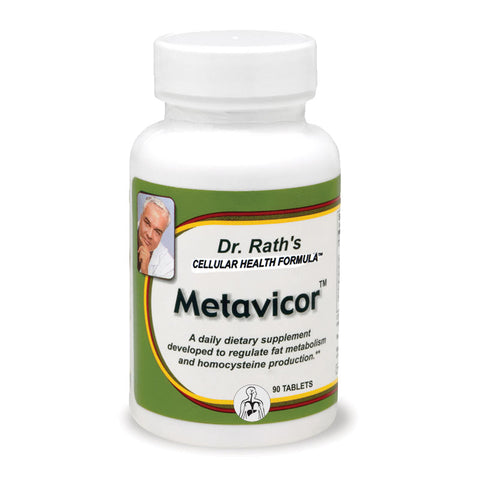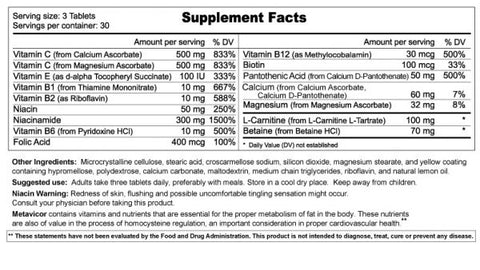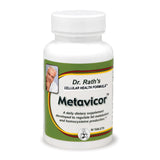- Home
- All Products
- DR. RATH’S METAVICOR™ SYNERGY FORMULA
Sold out.
Description:

CELLULAR NUTRIENTS TO SUPPORT HEALTHY FAT METABOLISM AND HOMOCYSTEINE LEVELS
All life processes in our body’s cells generate a variety of intermediate products, nutritional compounds and biological waste materials which are transported in the blood. Some of these components can be indicative of our health status. As such, most blood tests evaluate the levels of blood lipids (triglycerides, cholesterol) and homocysteine.
But how do these molecules affect our health and body functions?
Cholesterol, much like coenzyme Q10, is a downstream product of the metabolic pathways of mevalonate. Optimum production of cholesterol and other fat molecules in the liver and maintaining normal blood lipid levels are crucial for proper functioning of the heart, blood vessels and general well-being. Cholesterol is required for synthesis of many hormones, vitamin D and bile. Most of all, cholesterol is an essential component of all cell membranes, and it is needed to insulate the nerves and support the brain and functions of other organs. Although cholesterol is ingested with food, most of it is produced in the liver. Thus, a good balance between diet, internal synthesis and utilization of cholesterol and other fats in metabolism is important for general body health.
Homocysteine is formed in the body as an “intermediate product” in the biological conversion of the amino acid methionine which is a building block of proteins and an important molecule in the body’s metabolism. In a healthy state, homocysteine does not accumulate in the cells, but it is swiftly processed to generate other compounds. The B vitamins along with other natural substances play an essential role in normal homocysteine metabolism and in maintaining its healthy blood levels.
MetavicorTM can be taken alone or with other formulas in the <Dr. Rath Synergy Program>.
The ingredients in MetavicorTM have been combined in accordance with the scientific principles to support their respective functions in various aspects of cellular metabolism.
Vitamins B6, B12, folic acid and betaine play a key role in homocysteine metabolism.
Biotin and the B vitamins contribute to optimal energy metabolism essential for all cellular functions.
Vitamin B3 (niacin) is needed to support normal HDL, LDL and total cholesterol levels.
Vitamin C has been shown to regulate activity of the enzyme involved in cholesterol synthesis.
Carnitine assists in fatty acid metabolism as it is involved in transporting fatty acids into the mitochondria where they are processed in the bioenergy cycle.
Vitamins C and E contribute to protecting the cells against oxidative stress.
*These statements have not been evaluated by the Food and Drug Administration. These products are not intended to diagnose, treat, cure or prevent any disease.




